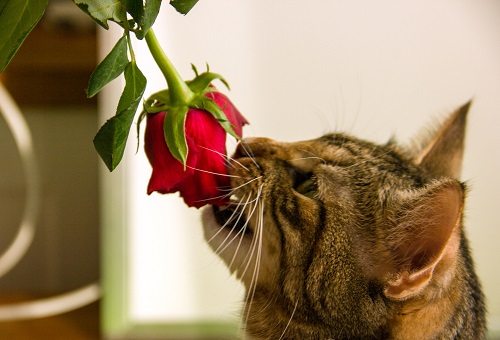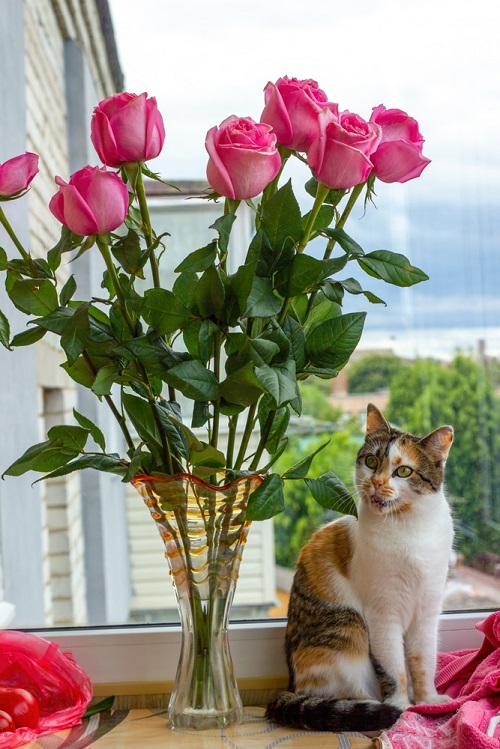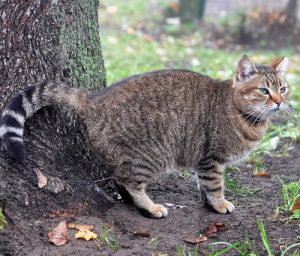Roses represent love and affection, but do they have the same effects on felines? Can Cats Eat Roses? Find out with us!
Cats are curious creatures – this statement does not limit only to edible items but to things like grass or other greens. Today’s question is – Can Cats Eat Roses? Scroll on to explore more and find out whether it is okay to let your cat indulge in this delicate flower.
Is Rainbow Elephant Bush Toxic To Cats? Find out here
What Are Roses?

Known for their stunningly beautiful and fragrant blooms, roses are flowering plants that belong to the Rosaceae family. They come in a variety of colors, including red, pink, yellow, white, and even black. Roses are widely grown for their ornamental value and fragrance in gardens, floral arrangements, perfumes, cosmetics, and even in foods and drinks. They have a long history of cultivation and have been valued for their beauty for thousands of years. Today, there are over 100 species of roses and thousands of hybrids that have been developed for their aesthetic appeal and commercial value.
Are Roses Safe For Cats To Eat? | Are Roses Toxic To Cats?
If you are a plant enthusiast, along with being a pet parent, you may wonder how safe your indoor plants are for your cat. Is it safe for cats to eat roses? Although not toxic, roses are not safe for cats to eat. The main concern with cats consuming roses is the potential for digestive upset. While felines are not typically attracted to the taste of roses, it is best to ensure that they do not have access to them.
Risks Of Feeding Roses To Cats

- Roses contain glycosides and essential oils that can be toxic to cats if consumed in large amounts.
- Ingesting roses can cause gastrointestinal symptoms such as vomiting, diarrhea, and abdominal pain.
- Rose thorns can pose a physical hazard to cats if they accidentally ingest them or get them stuck in their mouth or digestive tract.
- Eating roses can also be a choking hazard for cats if they swallow whole petals or other plant parts.
Why Are Cats Attracted To Roses?
- Scent: Roses have a strong and distinct fragrance that can attract cats, who have a highly developed sense of smell. The sweet and floral scent may be particularly appealing to felines who enjoy exploring their environment through scent.
- Texture: The soft and delicate texture of rose petals may also be appealing to felines, who may enjoy the sensation of chewing or nibbling on the soft material.
- Appearance: The colorful and intricate appearance of roses can also catch the attention of cats, who are known for their curiosity and interest in exploring their surroundings.
It is important to note that while cats may be attracted to roses, they are not a safe or appropriate food source for cats and can be potentially harmful if ingested.
Signs Of Rose Allergy In Cats

While rose allergy in cats is rare, it is important to be aware of the signs and symptoms that can occur if your cat is allergic to roses.
- Skin irritation: If your cat is allergic to roses, it may experience skin irritation or allergic dermatitis, which can manifest as redness, swelling, and itching around the nose, mouth, and paws.
- Sneezing and coughing: Allergic reactions to roses can also cause respiratory symptoms in cats, such as sneezing, coughing, and wheezing.
- Lethargy and loss of appetite: Allergic reactions also make cats feel lethargic, tired, and less interested in food or play.
- Difficulty breathing: In rare cases, severe allergic reactions can cause difficulty breathing or anaphylaxis, which requires immediate veterinary attention.
Tips For Preventing Accidental Ingestion Of Roses
- Keep out of reach: Place roses and other potentially harmful plants in areas that are inaccessible to your cat. This could include high shelves, hanging baskets, or separate rooms.
- Provide alternative sources of entertainment: Offer your kitty toys and activities that will keep them occupied and away from potentially harmful plants.
- Use deterrents: You can use natural deterrents such as citrus peels or vinegar to discourage your feline from approaching and nibbling on plants.
- Provide training: Train your feline to stay away from certain areas or objects by using positive reinforcement and redirecting their attention to more appropriate activities.
- Supervise outdoor play: If your cat enjoys spending time outside, supervise their play and keep them away from roses or other potentially harmful plants.
Options Other Than Roses
Here are some alternatives to roses that are safe for cats to be around:
- Spider Plant – Not only is this plant safe for cats, but it is also a great air purifier and easy to care for.
- Bamboo Palm – This plant is non-toxic to cats and can help improve indoor air quality by filtering out harmful chemicals.
- African Violet – These colorful flowers are safe for felines and can add a pop of color to your home.
- Christmas Cactus – This festive plant is safe for kitties and blooms during the winter months.
- Marigolds – These bright and cheery flowers are safe for cats and can also help repel insects.
- Petunia – These flowers are non-toxic to felines and attract butterflies to your garden.
- Rosemary – This fragrant herb is safe for felines and can be a great addition to your cooking.
While these plants are safe for cats, always monitor your feline friend to avoid overconsumption and any mishaps.
Can Cats Eat Roses? Quick Takeaways!
- Roses are not safe for cats to eat due to the potential for digestive upset.
- Ingesting roses can cause gastrointestinal symptoms.
- Cats may be attracted to roses due to their scent, texture, and appearance.
- Signs of rose allergy in cats include skin irritation, respiratory symptoms, digestive issues, lethargy, and difficulty breathing in severe cases.
- It is essential to keep roses out of the reach of felines to prevent accidental ingestion and potential health issues.
- Keep your cat safe from roses by keeping them out of reach, using deterrents, and supervising it when playing outdoors.
- Some safe alternatives to roses for cats are spider plants, bamboo palms, African violet, Christmas cactus, marigolds, petunia, and rosemary.



